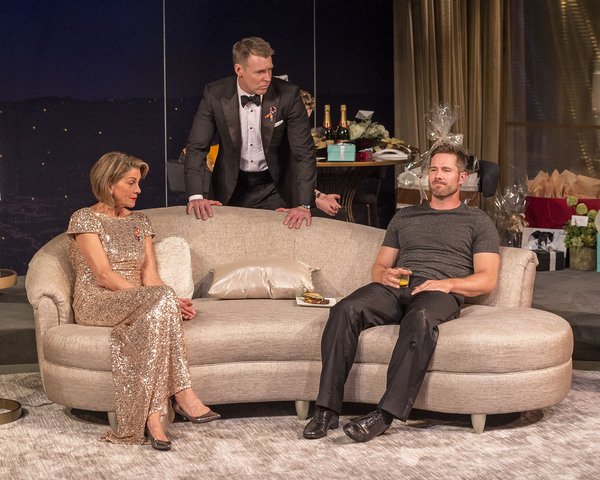A STAR IS BORN
Paul Rudnick’s bright new comedy takes place on Oscar night. Michael (Brian Hutchison) is a journeyman actor with a career and life-changing Best Supporting Actor nomination. After years of steady theater work and occasional television guest shots, he is on the verge of becoming a star. His trans nephew Eddie (Tom Phelan) hopes when Michael wins (not if, but when) he will use the platform to lambaste Hollywood for its treatment of actors and characters who fall within the alphabet soup of LGBTQ’”you can add more letters according to your generational orientation.
Everyone has his, her, or their own opinions, including his agent Cary (Max Jenkins), partner Austin (Luke Mcfarlane), mother Esther (Wendie Malick), and new friend Eleanor (Kecia Lewis). At first, it appears the play will stay focused on Michael’s acceptance-speech dilemma, but Rudnick has a lot more he wants to explore. Before the night is over, violence and hatred transform his deft comedy of manners into something deeper, though happily, no less funny.
Oh, and another little thing happens: A star is born. Max Jenkins. From the moment this theater and television veteran steps onto the stage in his shiny tuxedo pumps, he commands our attention, paralleling the play’s Cinderella story of a working actor coming into his own. His sly wit, gleeful underplaying, and unexpected moments of pathos are astonishing. Rudnick and director Walter Bobbie give Jenkins free rein to turn this “shallow” agent into the emotional heart of the show. Look beneath all his fake show-biz tinsel and glitter and what do you find? The true show-biz tinsel and glitter within.
 Wendie Malick, of course, is already a star. But if she weren’t, it would take little more than the cool insouciance with which she wears her William Ivey Long evening gown to turn her into one. Her Esther calls herself a Jewish mother, but if so, she’s the wittiest, smartest, sexiest Jewish mother the world has ever seen. Esther arrives to Michael’s big night with a smashing surprise of her own (no spoilers here) and a warm heart that belies her droll one-liners.
Wendie Malick, of course, is already a star. But if she weren’t, it would take little more than the cool insouciance with which she wears her William Ivey Long evening gown to turn her into one. Her Esther calls herself a Jewish mother, but if so, she’s the wittiest, smartest, sexiest Jewish mother the world has ever seen. Esther arrives to Michael’s big night with a smashing surprise of her own (no spoilers here) and a warm heart that belies her droll one-liners.
As Michael, Brian Hutchinson has a difficult task. The character is so grateful for his career, so in love with his handsome activist partner, so lovely to his nephew and his mother, and so welcoming to everyone he meets, that he runs the risk of becoming a bit dull’”like Sidney Poitier’s “Good Negro” in Guess Who’s Coming to Dinner. Hutchinson is an actor of range and color, who steers well away from making Michael into the “Good Homosexual,” but Rudnick could afford to give the character some darker notes.
 Explosive, hilarious moments from Kecia Lewis pop up along the way, and her timing is beautiful. (So is her William Ivey Long evening gown.) Luke Mcfarlane and Tom Phelan are equally effective. Much was made in the press during Phelan’s run on ABC’s The Fosters about the actor’s real-life trans identity. Visibility is wonderful, but talent is what matters most, and Phelan has it to spare.
Explosive, hilarious moments from Kecia Lewis pop up along the way, and her timing is beautiful. (So is her William Ivey Long evening gown.) Luke Mcfarlane and Tom Phelan are equally effective. Much was made in the press during Phelan’s run on ABC’s The Fosters about the actor’s real-life trans identity. Visibility is wonderful, but talent is what matters most, and Phelan has it to spare.
Director Walter Bobbie has a flair for light comedy, and he easily balances the emotional moments, never letting the pendulum swing too far one way or the other. For my money, Bobbie is theater. And theatre. His decades of experience inform every single choice he makes with his actors and designers. John Lee Beatty’s hotel suite set is a brilliant, towering, expensive wonder’”so luxe it’s almost ugly. As already noted, William Ivey Long knows his way around an evening gown. His formal wear for the four male characters is less flashy, but just as impactful in subtler ways.
Rudnick is a comic pointillist who would have been happily at home in another era, taking his rightful place alongside the likes of Noël Coward and Philip Barry. What makes him modern and relevant, though, is his ability to find human connection in our culture’s vanities, pretensions, and obsession with celebrity. Even Libby Gelman-Waxner has a heart of gold. And I love that Rudnick is so sneaky. Here he comes with a glittering new commercial comedy. Some people might not notice that among its six-member cast, not one character is a straight white male. Change doesn’t have to wear its importance on its sleeve. Rudnick is sublimely confident in his own voice, his own humor, and his own way of seeing the world. With Big Night, he is at the top of his game.
photos by Craig Schwartz
Big Night
Kirk Douglas Theatre
9820 Washington Blvd in Culver City
ends on October 8, 2017
for tickets, call 213.628.2772 or visit CTG






{ 1 comment… read it below or add one }
Mr. Bernstein, you must be out of your mind, or you are friends with everyone involved with this nightmare. This terrible play slimed me more than I can say: The horrid and unnecessary tonal shift from comedy to Movie-of-the-Week tragedy; the wholly unbelievable situation and characters; the playwright’s agenda — spouting facts and figures about the gay community — is more important than storytelling (and I’M GAY!); and some miscasting on top of it. I have never — and I mean NEVER — been as angry at a show as this one. My only regret was not having walked out when I first wanted to.